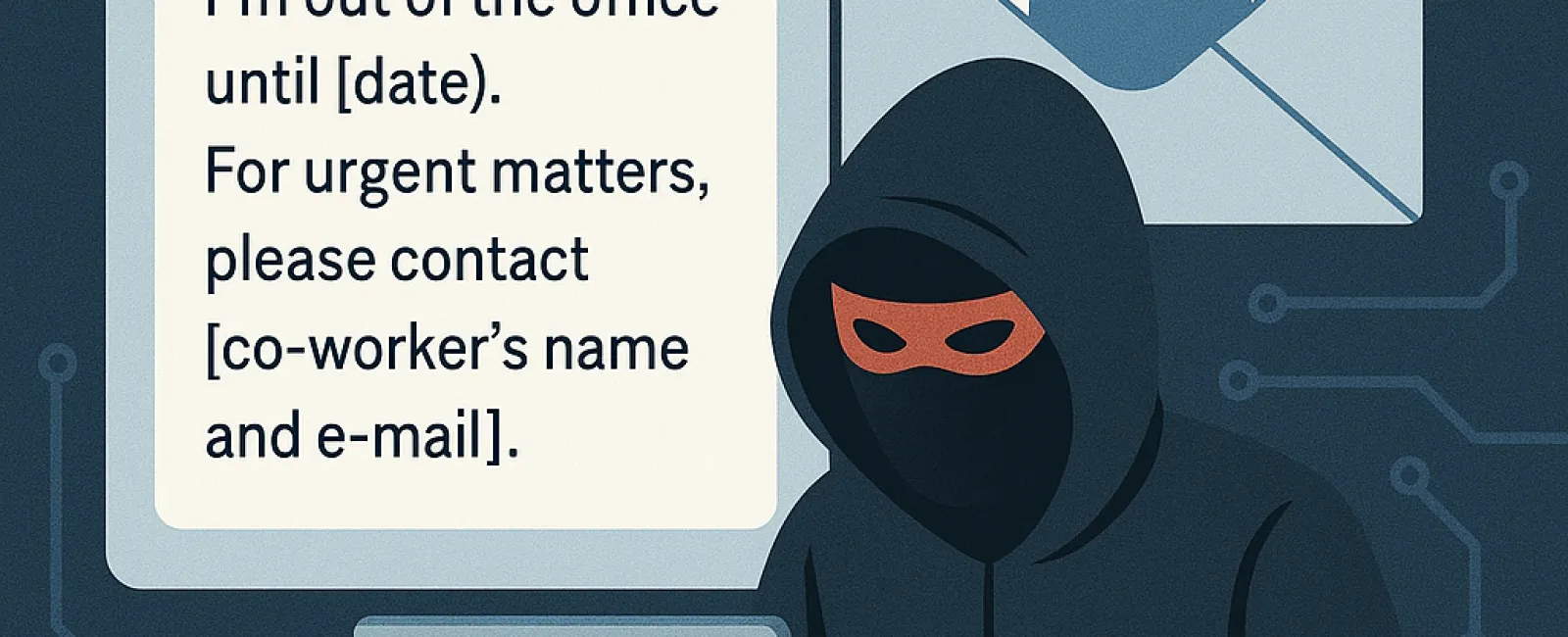June 16, 2025
You've been planning that beach getaway for months. Before
you head out, you set your out-of-office email:
"Hi there! I'm out until [date]. For urgent matters, contact
[coworker's name and email]."
Helpful? Sure.
Harmless? Not quite.
That innocent little message you just set up? It might be
exactly what a hacker's been waiting for.
What Cybercriminals See in Your Auto-Reply
That OOO message tells folks:
- Who
you are and what you do
- When
you'll be gone
- Who's
in charge while you're out
- Sometimes
even where you're going
To a cybercriminal, that's a blueprint for a scam.
They now know:
- You're
offline and probably not checking messages.
- Exactly
who to impersonate and who to target next.
And just like that, they've got everything they need to
launch a Business Email Compromise (BEC) attack.
Here's How It Plays Out
- Your
auto-reply goes out.
- A
scammer copies your style and pretends to be you (or your backup).
- An
"urgent" email lands in someone's inbox—asking for a wire transfer, a
password, or a sensitive file.
- The
coworker, thinking it's you, acts fast.
- You
come back from vacation to find $45,000 sent to a fake vendor.
And no, this isn't just a worst-case scenario—it happens
more than folks like to admit.
Traveling Teams Are Prime Targets
If your business has traveling execs, sales reps, or admins
fielding messages while someone's away, it's an open door for scammers. Why?
- Admins
are juggling messages from multiple people.
- They're
often trusted with sensitive info and fast decisions.
- And
they don't expect "urgent" messages to be fake—especially from someone
they trust.
One crafty email is all it takes.
How to Keep Auto-Replies From Becoming Attack Vectors
Here's how to outsmart the scammers—without ditching your
OOO message altogether:
1. Keep It Vague
No need to list your travel plans or who's covering you.
Just say:
"I'm currently out of the office and will respond when I
return. For immediate needs, please contact our main line at [main contact
info]."
2. Train Your Team to Be Skeptical
Remind them:
- Never
act on financial or sensitive requests via email alone.
- Always
confirm unusual asks through a second method—like a quick phone call.
3. Use Better Email Security Tools
Set up:
- Anti-spoofing
filters
- Domain
protection (so nobody can fake your address)
- Intelligent
email threat detection
4. Turn on MFA Everywhere
Multi-factor authentication stops many hackers in their
tracks—even if they have a password.
5. Work With a Watchful IT Partner
You need someone who monitors login attempts, flags weird
activity, and shuts down threats before they become disasters.
Want a Vacation That Doesn't End With a Cyber Headache?
We help business owners build smarter, safer systems—so you
can relax while your tech stays on guard.
👉 [Book Your FREE
Security Assessment Here]
We'll check your systems for gaps and help you close them
before scammers can sneak in. That way, the only surprise waiting for you when
you get back is a sunburn and a full inbox—not a security breach.
"Hi there! I'm out until [date]. For urgent matters, contact
[coworker's name and email]."
Helpful? Sure.
Harmless? Not quite.
That innocent little message you just set up? It might be
exactly what a hacker's been waiting for.
What Cybercriminals See in Your Auto-Reply
That OOO message tells folks:
- Who
you are and what you do
- When
you'll be gone
- Who's
in charge while you're out
- Sometimes
even where you're going
To a cybercriminal, that's a blueprint for a scam.
They now know:
- You're
offline and probably not checking messages.
- Exactly
who to impersonate and who to target next.
And just like that, they've got everything they need to
launch a Business Email Compromise (BEC) attack.
Here's How It Plays Out
- Your
auto-reply goes out.
- A
scammer copies your style and pretends to be you (or your backup).
- An
"urgent" email lands in someone's inbox—asking for a wire transfer, a
password, or a sensitive file.
- The
coworker, thinking it's you, acts fast.
- You
come back from vacation to find $45,000 sent to a fake vendor.
And no, this isn't just a worst-case scenario—it happens
more than folks like to admit.
Traveling Teams Are Prime Targets
If your business has traveling execs, sales reps, or admins
fielding messages while someone's away, it's an open door for scammers. Why?
- Admins
are juggling messages from multiple people.
- They're
often trusted with sensitive info and fast decisions.
- And
they don't expect "urgent" messages to be fake—especially from someone
they trust.
One crafty email is all it takes.
How to Keep Auto-Replies From Becoming Attack Vectors
Here's how to outsmart the scammers—without ditching your
OOO message altogether:
1. Keep It Vague
No need to list your travel plans or who's covering you.
Just say:
"I'm currently out of the office and will respond when I
return. For immediate needs, please contact our main line at [main contact
info]."
2. Train Your Team to Be Skeptical
Remind them:
- Never
act on financial or sensitive requests via email alone.
- Always
confirm unusual asks through a second method—like a quick phone call.
3. Use Better Email Security Tools
Set up:
- Anti-spoofing
filters
- Domain
protection (so nobody can fake your address)
- Intelligent
email threat detection
4. Turn on MFA Everywhere
Multi-factor authentication stops many hackers in their
tracks—even if they have a password.
5. Work With a Watchful IT Partner
You need someone who monitors login attempts, flags weird
activity, and shuts down threats before they become disasters.
Want a Vacation That Doesn't End With a Cyber Headache?
We help business owners build smarter, safer systems—so you
can relax while your tech stays on guard.
👉 [Book Your FREE
Security Assessment Here]
We'll check your systems for gaps and help you close them
before scammers can sneak in. That way, the only surprise waiting for you when
you get back is a sunburn and a full inbox—not a security breach.


